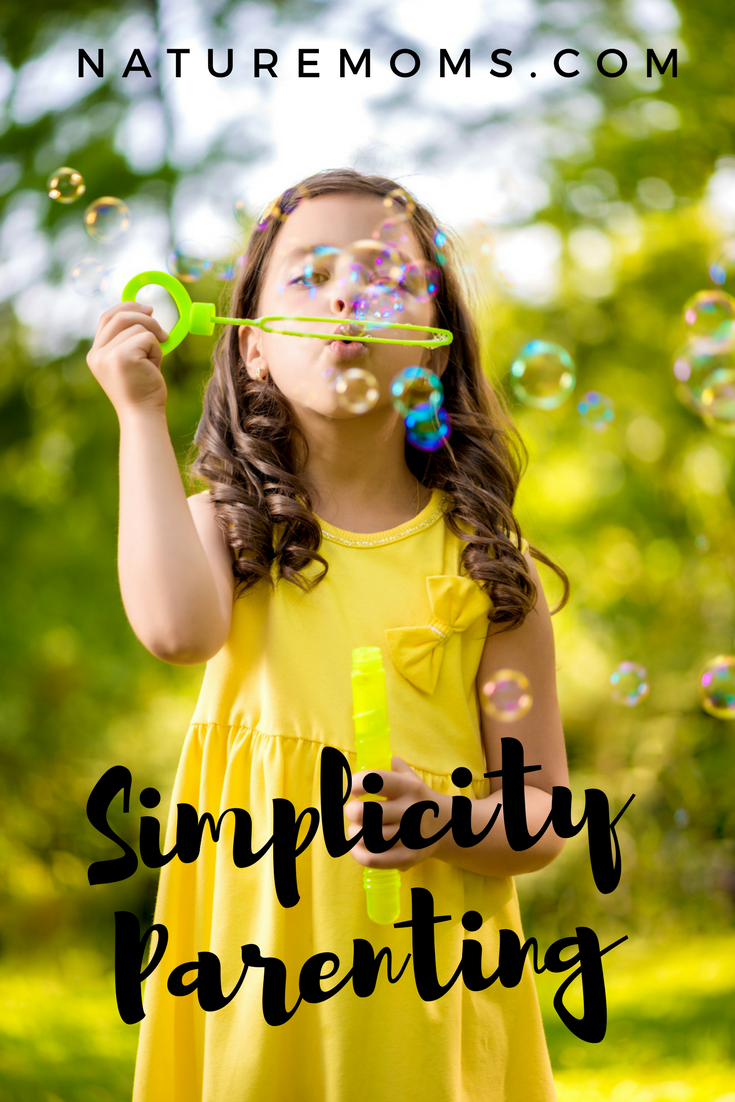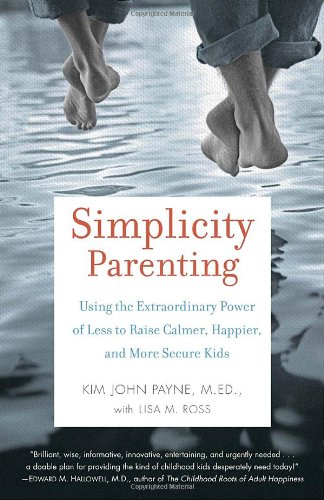 Over the weekend I dived into a book I have been meaning to read for the past few weeks. I guess with all the holiday activity recently it didn’t seem like the best time to read it, just in case I decided to act on any of the action plans contained in the book. I am glad I waited until I could give it my full attention because it is a rare gem.
Over the weekend I dived into a book I have been meaning to read for the past few weeks. I guess with all the holiday activity recently it didn’t seem like the best time to read it, just in case I decided to act on any of the action plans contained in the book. I am glad I waited until I could give it my full attention because it is a rare gem.
The book is Simplicity Parenting – Using the Extraordinary Power of Less to Raise Calmer, Happier, and More Secure Kids. I assumed it was a book about voluntary simplicity but focused on kids and it is that but also so much more. The author, Kim John Payne is a therapist and he worked for many years in war torn areas of the third world helping kids with post traumatic stress issues. Ironically when his career changed directions and he came to practice in the US he noticed something strange about the children he was now treating. The children in this New England town that he was hired to help also showed the classic signs of post traumatic stress. But how could that be? These kids didn’t live in a war ravaged country or have to fight for their very survival. What did they have to be so stressed about?
Basically he found that all the stuff going in on their lives was taking away from their childhoods and that they were becoming stressed. Many of the quirks that all kids have were becoming full blown disorders because of the stressful lives they were living… ADD, ADHD, OCD, ODD, etc. Some kids dealt with this stress and overabundance of activities and things in their lives by regressing into their own world (ADD, ADHD) and some would struggle to get control (OCD, ODD) but usually it all stemmed from the same problem, stress brought on by the life and lifestyle of the family. This particular therapist created a very successful practice and became Internationally renowned by helping parents to change the way they lived and parented by getting back to simplicity. These families and kids had too much stuff, too many choices, and too little time.
The book has basic action plans for simplifying the family dynamic.. decluttering the environment, establishing comforting rituals and routines, scheduling breaks, and scaling back on media and parental “hovering”.
I especially liked that the chapters on decluttering the home had lists of things to look for in toys and entertainment to either qualify or disqualify them as something we should have in the home. It brought up many things I hadn’t considered and yet many were things that I have considered already in my drive to parent “naturally”. It compliments natural parenting very well in fact. One statistic that was horrifying to read is that the average American child has around 150 toys. Even more horrifying is that before I adopted a more natural and green lifestyle I am positive my kids had double that number. How can a single child possibly play with 150 toys and be responsible for keeping them tidy? That is overload. One area that I hadn’t considered is book overload and I think my kids are nearing or past that point. The book made a lot of great points about why we should not have more than half a dozen books in our kids rooms and wow it REALLY made sense. It made a case for how we might actually be impeding their love of reading by giving them access to that many books and several real life examples were shown.
With toys and books it is recommended that we store the majority of the “keepers” in a place out of their reach and use these collections as sort of a lending library. The book has motivated some BIG time decluttering in this house, specifically in the kids rooms. In my daughter’s room for instance all her toys now fit in two small baskets under her bed. My oldest son’s are in a chest in his closet and it is not even a 1/4 full. Just as promised by the author… they never even noticed the change. I also loved the idea of creating a small art center in each child’s room… just a table, chair, and art supplies.
Another suggestion I loved in the book had to with routines. I like to keep the mornings peaceful and unhurried so I loved the idea of one the author’s clients to light a candle at the breakfast table instead of turning lights on. Awhile back the light over our kitchen table malfunctioned and not wanting to deal with expense of an electrician we opted to eat by candlelight and I really miss that so I am inspired to bring that back (even though our light works). I have to have 3 candles, one for each child to blow out, so there is no fighting over this honor, LOL.
It had great information about the importance of family dinners and simplyfing that whole routine as well. The author’s family does a moment of silence to set the mood for the meal and that didn’t interest me so much but I loved the alternative suggestion to spend a moment giving thanks even for secular families like mine. Aka thanks to the farmers who grew these vegetables, thanks to Nana who who passed on this delicious recipe to us, and allowing the kids to express what they are thankful for. I like rituals like this that have no religious overtones.
Also good was the chapter on TV and media. I read it after reading a blog post on a mom blog about the benefits and joys of TV and how parents who try and restrict TV are being fear mongers. The week before I had visited a blog that is dedicated to helping parents avoid “hovering” and let heir kids have more meaningful and freeing experiences while learning self reliance. I was dissapointed to learn (after a recent post) that these concepts were not so much the result of the author’s dedication to child development but rather the desire to have her kids out of her hair and not bothering her, so the electronic babysitter was a big hit in their house. It seemed almost the exact opposite of what her blog represented so I felt kinda tricked and thus discouraged about TV and media.
Simplicity Parenting was refreshing and helped to reinforce that lots of TV exposure over all can be very damaging. Kids don’t have meaningful experiences in front of the TV and they don’t learn self reliance from it either. More often than not they learn to sit and be entertained instead of creating exciting real life experiences. More often than not they learn to be consumers and feel that they don’t have enough and that their lives are not enough. TV is designed to impart those messages… otherwise why would 16 billion be invested annually in using the TV to market to children??? If it wasn’t working EXACTLY as they intended than they wouldn’t be spending that much money. Think about it.
I do believe that the TV can be a window to exciting possibilities. I love the show Man Versus Wild for example and various Discovery Channel programs are wonderful. BUT the TV can also be a window into adult content and ideas that kids are not mature enough for and it can easily replace real life adventures and that is truly sad. This book has confirmed for me that we need to do even more in regards to discouraging TV viewing.
Other areas addressed in the book are parental hovering and also overscheduling our kids. Particular attention is paid to sports and it has much to say in regards to the argument you hear from many parents that sports have all these important life lessons to teach and that they help keeps kids out of trouble. It is not anti-sports, rather pro sports with some much needed perspective.
Overall, a great book with really helpful ideas for addressing one of the biggest issues we are facing… the fast paced, highly stressed, materialistic, overwhelming nature of today’s childhood and what we can do to help create change. The advice stop notch and the real life stories of how families and children applied this advice and benefited was very heart warming.
Some other reference books mentioned by the author include: The Hurried Child, The Power of Play,The Over-Scheduled Child: Avoiding the Hyper-Parenting Trap




Sounds like a great book!
I am going to have to get a copy of this book! I have a degree in child development and it sounds like all the points are dead on! My husband just asked me when we would let our baby watch TV (I had given him the stats on ADD/ADHD on children under the age of 18 months watching TV) and I told him maybe never! We only watch TV when she sleeps, she thinks the remotes are just toys and since there is never a TV on we let her play with them. I am all for children having less, especially less electronics! I love the idea of a lending library in your home. Anyways I am excited, thanks for sharing!
Thanks for the review. I love all the points. I find no TV or little TV an easy one for us but I need to get a handle on the toys and the books. I always tell myself books are good for them and I love books but I know they shouldn’t have access to so many at a time, thanks for the reminder! And the toys, oh the toys! It’s a never ending cycle of Receiving gifts and getting rid of things, it’s hard to keep up with it! I’m hoping a possible move in the near future will help us unload some things. I wonder what it said about clothing. I try to keep that to a minimum as well but find myself in a similar place as with the toys. Thanks for your insight.
Katie, the book indicated that only seasonal clothes that fit at the moment should be in their closet, otherwise it can be overwhelming. Although I don’t remember limits beyond those I am sure that having too many clothes would be similar to having too many toys… aka too many choices. At least for young kids.
I’m gonna go get this book right now! (Well, I guess I should check out the library first.) Thanks for all your great blogs!
Seems like a very good and insighful book. Will get it right away.
First, great review! I will definitely try to read this at some point. However, I do have a couple comments regarding TV watching. I agree that TV should be monitored and limited to certain times. I also think that you are right on the money (no pun intended) when it comes to marketing. But— I can’t tell you how many times I had and have “meaningful” experiences with a TV show. I watched shows like Boy Meets World and Full House and Family Matters and Growing Pains (oh the good ol’ days), and I can tell you that I learned something important from every single show. So, I have to respectfully disagree, because I don’t think it’s TV in general that is bad, but certain channels and shows are the problem. I know you mentioned that Discovery and other educational stations are acceptable, but I do think there are other shows that have merit.
Maybe its the old programming Manda, I am not liking what they have on now… like iCarly and Drake and Josh. These shows seem more suitable for teens and yet they play in between episodes of SpongeBob? They are trying to reach young kids with mature messages. Also shows that seem like they are for kids and are actually adult like The Simpsons or Family Guy… argh.. they are disgusting. The way you feel about TV is the way I feel about many movies so of course it isn’t all bad. I just don’t like what my kids in particular seem to learn from modern kids shows.
Great post. The impact of stress is such a critical factor in today’s parenting and parents are unaware of the need to do less and be more and of the behavioral changes that occur in our kids under such conditions.
Thanks for contributing your thoughts and review of a wonderful book.